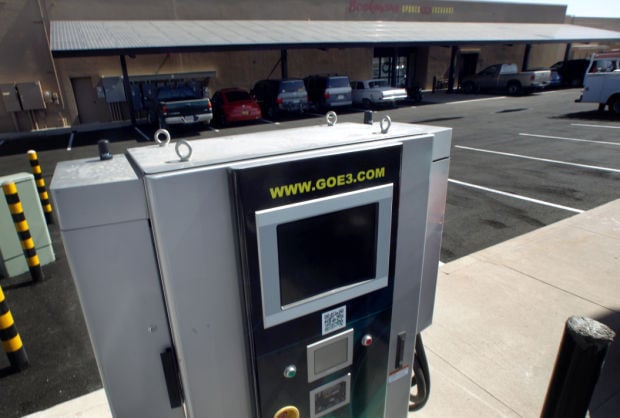A reader from Green Valley called the Road Runner the other day with an interesting question: Shouldn’t electric car owners pay their share to use public roads?
The question stems from the fact that much of the funds used for Arizona roads come from state and federal fuel taxes, each costing drivers 18 cents per gallon of gasoline.
But electric cars don’t use gasoline, and the Arizona Department of Transportation told the Road Runner the state does not levy taxes specific to the 34,387 electric vehicles registered in the state, including 2,649 in Pima County.
Instead, the state offers a number of Green Driver Incentives to electric-car owners, such as a lower cost for the vehicle license tax, exemptions from emissions testing and permanent access to high-occupancy vehicle lanes.
So far, 10 states have answered the question of whether electric car owners should pay for roads by levying an annual fee.
The fees range from $50 in Wyoming and Colorado to $200 in Georgia, according to a Dec. 3 report in Car and Driver magazine.
The adoption of those taxes appears to be a growing trend since 2011, when Nebraska and Missouri adopted the taxes, Car and Driver reported.
Two years later, Virginia and Washington adopted an electric-car tax. Colorado and North Carolina followed suit in 2014 and Idaho, Georgia and Wyoming did the same in 2015. Michigan is slated to start levying the tax in 2017.
The Arizona Legislature considered such a fee in 2013 when Steve Farley, a Democratic state senator from Tucson, proposed a 1-cent-per-mile tax on electric vehicles. His bill followed the general principle of “the more you drive, the more you should pay,” Farley said.
Using the Federal Highway Administration’s estimate of 13,500 miles driven by the average car owner each year, a gas-powered car that gets 25 miles per gallon would use 540 gallons annually and cost the owner $97 in gas taxes.
Using those numbers, Farley’s bill would have injected about $135 annually per electric-car driver into the Highway User Revenue Fund, which comes out to $4.64 million each year for all of Arizona’s electric cars.
To put that in perspective, the state collects about $630 million in gas taxes annually.
Farley’s proposal stalled when the Legislature couldn’t come up with a way to track the mileage in a way that wasn’t “intrusive,” he said, noting Oregon is addressing that problem with a voluntary program that offers various tracking options.
The bill came as revenues from gas taxes dwindled, due in part to more efficient vehicles, Farley said.
“Gas taxes are going to become less and less significant as a source of funding,” he said.
Gasoline sales in Arizona declined from 2.87 million gallons in 2007 to 2.6 million gallons in 2013, ADOT records show. Since then, sales have rebounded somewhat to 2.72 million gallons in 2015.
Farley’s proposal likely wouldn’t have had a major impact on revenues, given that electric cars account for a tiny portion of the 4.7 million passenger vehicles, pickups and vans registered with ADOT as of June 2015.
Instead, the goal of the bill was to get the conversation going in the Legislature about finding substitute sources of revenue for roads, Farley said.
However, “The Legislature doesn’t seem to be willing to have a conversation about transportation finance,” Farley said.
The annual fee in Farley’s bill was too high, said David Gebert, president of the Tucson Electric Vehicle Association and driver of a Nissan Leaf.
Gebert said he didn’t like Farley’s bill because it would have taxed electric cars at a rate similar to that for a relatively inefficient gas-powered car.
When asked if he thought electric-car owners should pay a tax, Gebert said: “Not yet. I think there ought to be a higher tax on gasoline and diesel until the air is clean.”
Gebert said he would be willing to pay an annual tax for road repairs, but only after electric-car ownership has been incentivized more and as long as the tax rate is comparable to the most efficient gas-powered cars on the road.
Drivers of compressed natural gas and propane-powered cars also should have to pay the tax, Gebert said.
Gebert noted electric-car owners, just like everyone else, pay the half-cent sales tax that goes toward transportation projects through the Regional Transportation Authority.
Down the road
ADOT is closing the right lane of the westbound Interstate 10 frontage road between Miracle Mile and Prince roads.
The agency also is closing the right lane of eastbound Prince Road between I-10 and Runway Street.
Both closures will last through August as ADOT installs a new drainage system at I-10 and Flowing Wells Wash and two 96-inch steel pipes underneath the Union Pacific Railroad tracks.
The northbound exit and right lane of Interstate 19 at Ajo Way, or Exit 99, will be closed from 11 p.m. Monday to 5 a.m. Tuesday to allow ADOT crews to install concrete barriers for drainage. Drivers can use the Irvington Road exit and local streets to get to Ajo Way.





